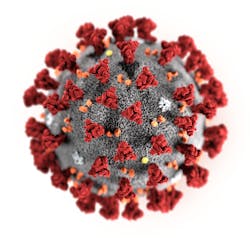The World Health Organization (WHO) director-general declared a public health emergency of international concern (PHEIC) regarding the novel coronavirus.
The director-general’s decision was based on the recommendation of WHO’s emergency committee, which met for the second time about the outbreak of the of novel coronavirus 2019 in China. During the meeting, representatives of China’s Ministry of Health shared the latest information about the outbreak in the country and the public health measures that the government has taken to contain the disease.
There are now 7,711 confirmed and 12,167 suspected cases throughout China. Of the confirmed cases, 1,370 people have severe illness, 170 people have died, and 124 people have recovered and been discharged from a hospital.
The WHO Secretariat provided an overview of the situation in other countries. There are 83 cases in 18 countries. Of these, only seven had no history of travel in China. There has been human-to-human transmission in three countries outside China, including one severe case. There have been no deaths.
At its first meeting, the committee expressed divergent views on whether this event constitutes a PHEIC or not. At that time, the advice was that the event did not constitute a PHEIC. The second meeting took place after significant increases in numbers of cases and additional countries reporting confirmed cases.
China has taken numerous measures to contain the outbreak, including daily contact with WHO representatives and comprehensive multi-sectoral approaches to prevent further spread. It has also taken public health measures in other cities and provinces; is conducting studies on the severity and transmissibility of the virus and sharing data and biological material. The country has also agreed to work with other countries who need their support.
During the meeting, committee members emphasized the need for enhanced surveillance in regions outside Hubei, including pathogen genomic sequencing, to understand whether local cycles of transmission are occurring.
Members of the WHO Emergency Committee said they believe it is still possible to interrupt virus spread, provided that countries put in place strong measures to detect disease early, isolate and treat cases, trace contacts, and promote social distancing measures commensurate with the risk. Committee members also noted that as the virus continues to evolve, so will the strategic goals and measures to prevent and reduce spread of the infection.
WHO officials said a forthcoming WHO multidisciplinary technical mission to China will include national and local experts. Members of the mission will review and support efforts to investigate the animal source of the outbreak, the clinical spectrum of the disease and its severity, the extent of human-to-human transmission in the community and in healthcare facilities, and efforts to control the outbreak.
WHO officials emphasized that all countries should be prepared for containment, including active surveillance, early detection, isolation and case management, and contact tracing. They also should share full data with WHO.
Countries should emphasize reducing human infection, prevention of secondary transmission and international spread, and contributing to the international response though multi-sectoral communication and collaboration and active participation in increasing knowledge on the virus and the disease, as well as advancing research, WHO officials said.
The WHO emergency committee did not recommend any travel or trade restrictions based on the current information available.

